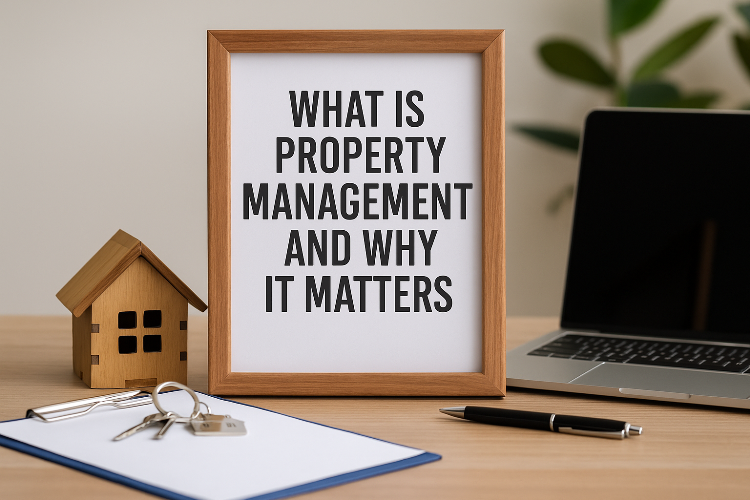So you’ve got a property—or maybe several—and now you’re asking: what next? That’s where property management steps in. Whether you’re renting out a family home or managing an apartment complex, understanding what property management is and why it matters can make or break your investment success.
Let’s dive into the nitty-gritty and uncover why this role is essential.
Understanding the Basics of Property Management
Definition of Property Management
In simple terms, property management is the day-to-day operation, control, and oversight of real estate. Think of it like babysitting a property—but with legal paperwork, tenant drama, rent payments, and a whole lot of problem-solving.
A Quick History of Property Management
Believe it or not, property management has been around since ancient times. Landowners back then had agents overseeing their land and tenants. Fast forward to today, and it’s evolved into a full-blown industry.
Residential vs. Commercial Property Management
Residential managers handle homes, condos, or apartment buildings. Commercial managers deal with office buildings, malls, or industrial spaces. While similar in nature, they require different skill sets and knowledge bases.
Core Responsibilities of a Property Manager
Tenant Screening and Placement
Great tenants don’t just fall from the sky. Property managers carefully screen applicants to ensure they’re reliable, responsible, and likely to treat your property with care.
Rent Collection and Financial Reporting
No one likes awkward money talks. Property managers ensure rent is collected on time and provide financial reports so owners can track income, expenses, and profits.
Maintenance and Repairs
Leaky faucet? Broken AC? Managers coordinate repairs with trusted vendors, ensuring everything is handled swiftly without owners needing to lift a finger.
Legal Compliance and Evictions
Property law is no joke. From fair housing rules to eviction procedures, property managers stay updated so you don’t accidentally end up on the wrong side of a lawsuit.
Benefits of Professional Property Management
Time-Saving for Owners
Imagine sipping coffee instead of chasing tenants for rent. That’s the gift of hiring a good manager—they take care of the hassles.
Increased ROI and Property Value
Professional management helps reduce vacancies, limit damage, and ensure timely repairs—boosting your return on investment (ROI).
Improved Tenant Retention
Happy tenants stick around. Managers who respond quickly and maintain the property well keep turnover rates low.
When Should You Hire a Property Manager?
Managing Multiple Properties
One property? Maybe you can manage. Five properties? You’re going to need help.
Living Far from the Property
If you don’t live nearby, it’s nearly impossible to handle emergencies or inspections in person.
Lack of Time or Experience
Not everyone is cut out for late-night phone calls about broken boilers. A manager brings expertise and time you might not have.
Common Myths About Property Management
“It’s Too Expensive”
Yes, they charge a fee. But in most cases, their service pays for itself through better tenants, reduced vacancies, and fewer costly mistakes.
“I’ll Lose Control Over My Property”
Not true! You set the guidelines—they handle execution. It’s teamwork, not a takeover.
“All They Do Is Collect Rent”
A good manager wears many hats: advisor, accountant, negotiator, handyman coordinator, and more.
Choosing the Right Property Management Company
Key Questions to Ask
- How do you handle tenant disputes?
- What’s your eviction process?
- Do you offer 24/7 emergency services?
- How often do you inspect properties?
Red Flags to Watch Out For
- Poor communication
- No online portal or reporting
- High staff turnover
- Negative reviews or lack of referrals
How Property Management Impacts Real Estate Investment
Enhancing Profitability
A well-managed property is a profitable one. From filling vacancies fast to keeping tenants happy, everything adds up.
Reducing Legal Risks
Property managers understand landlord-tenant laws. That knowledge can save you from court battles and fines.
Streamlining Day-to-Day Operations
They handle it all—so you can focus on growing your portfolio or just enjoying your free time.
DIY vs. Hiring a Property Manager: What’s Better?
Pros and Cons of Each Option
| DIY | Hiring a Manager |
|---|---|
| Full control | Expert support |
| Cost-saving (on surface) | Time-saving & legally safer |
| High learning curve | Less stress |
Which One Fits Your Lifestyle Best?
If you have time, patience, and interest—DIY could work. Otherwise, a property manager is like hiring a co-pilot for your real estate journey.
The Future of Property Management
Technology and Automation
Smart locks, rent payment apps, AI tenant screening—it’s a brave new world. Property management is going digital, making everything faster and more efficient.
Eco-Friendly and Sustainable Practices
Green building management is on the rise. Eco-conscious managers reduce costs and appeal to modern tenants.
Conclusion
Property management isn’t just about collecting rent or fixing toilets. It’s about maximizing your property’s potential while minimizing your stress. Whether you’re a seasoned investor or a first-time landlord, understanding what property management is and why it matters can help you make smarter, more profitable decisions.
FAQs
1. What is the main goal of property management?
The primary goal is to maintain the property’s value and generate income for the owner through effective operations and tenant relations.
2. Is property management only for rental properties?
No, it applies to any property requiring oversight—residential, commercial, or even industrial.
3. How much does a property manager typically cost?
Most charge around 8–12% of monthly rental income, plus fees for leasing or special services.
4. Can I switch property managers mid-contract?
Yes, but review your agreement for notice periods and termination clauses first.
5. Are property managers licensed?
In many states or countries, yes. Licensing ensures they follow professional and legal standards.



